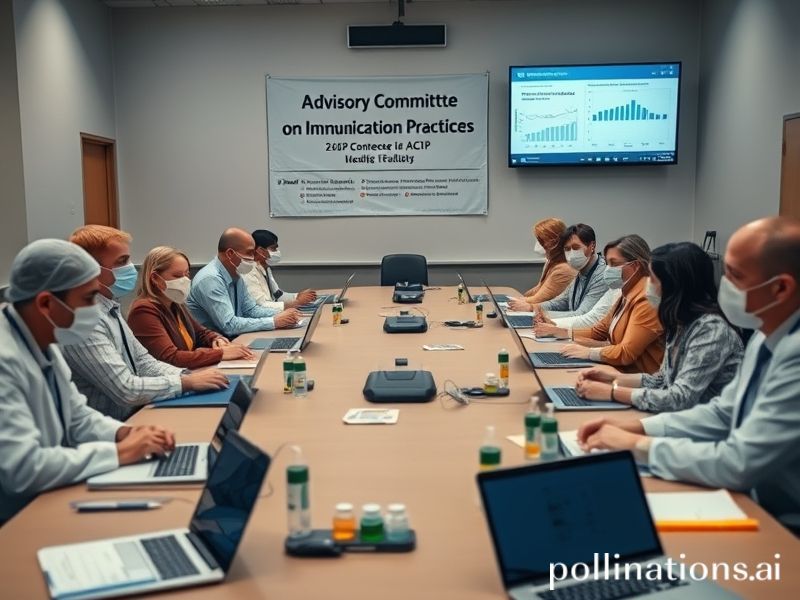Inside the ACIP Meeting: How 15 Americans Quietly Decide the Planet’s Next Shot at Survival
The ACIP Meeting: Where the World’s Vaccine Gods Decide Who Lives, Who Dies, and Who Gets a Sore Arm
By the time the Advisory Committee on Immunization Practices (ACIP) wrapped its latest closed-door séance in a beige Atlanta Marriott, roughly 5.7 billion human beings were already speculating—via group chats, op-eds, and the occasional goat sacrifice—about which arm the needle will enter next. That’s the gravitational pull of ACIP: fifteen unelected Americans in sensible shoes quietly redrafting the global choreography of panic, profit, and public health.
ACIP is supposed to be a technical panel. In practice it’s the planet’s informal Ministry of Destiny. When it votes to add (say) a new dengue shot to the childhood schedule, ministries from Manila to Maputo scramble like Black-Friday shoppers at a TV aisle. Manufacturers in Pune re-tool production lines; cold-chain consultants in Copenhagen update slide decks; and, somewhere in Geneva, a WHO intern updates a spreadsheet titled “Global Stockpile—DO NOT SORT.” The ripple is instantaneous, lucrative, and occasionally life-saving—though never quite as life-saving as the press releases claim.
This week’s agenda was a festival of alphabet-soup pathogens: RSV, MenABCWY, and something called “updated Covid-19 formulation 2024-2025,” which sounds less like a vaccine and more like a limited-edition craft IPA. The committee members—mostly pediatricians with the haunted look of people who’ve read too many grant applications—listened to data so fresh it was still steaming. They nodded, frowned, and asked pointed questions about “real-world effectiveness,” a phrase that roughly translates to “will this still work once TikTok gets hold of it?”
Meanwhile, the rest of the planet watched through a keyhole. Journalists in Lagos live-tweeted; Brazilian doctors dissected slides in WhatsApp groups named things like “Vacinação Sem Vergonha.” The Chinese state broadcaster ran a chyron reading “U.S. Experts Debate Respiratory Viruses” while airing B-roll of Americans coughing on each other at a football game—subtle as a brick, but effective. In Strasbourg, European regulators scheduled their own copycat meeting for next month, because nothing says continental autonomy like waiting to see what Atlanta does first.
The stakes, of course, are higher than ever. The global south is still owed about 800 million doses from the last wave of promises, a debt now trading on secondary markets like sub-prime mortgages. Each ACIP recommendation can reroute cargo planes full of syringes from one hemisphere to another, often landing in countries whose names the shipping clerks can’t pronounce. And while the committee insists it is “evidence-based,” the evidence increasingly comes from trials conducted in places where participants get a T-shirt and the sponsor gets the patent.
Dark humor is baked into the process. Consider the slide titled “Cost-Effectiveness Analysis,” which converts human lives into quality-adjusted life years (QALYs) with the cold precision of an accountant valuing office furniture. Or the moment a member asked whether a maternal RSV shot might “interfere with market uptake” of infant monoclonals—because nothing screams altruism like worrying about product cannibalization. The chat box, supposedly muted, briefly flashed “LOL capitalism,” attributed to “Guest_47.” No one claimed ownership.
Yet for all the cynicism, ACIP remains the closest thing we have to a planetary immune system—imperfect, underfunded, and occasionally hijacked by politics, but still capable of producing consensus documents that save more lives than most governments. When the final vote came—13-1 with one abstention (the dissenter worried about “equitable messaging,” which is committee-speak for “our website will be memed into oblivion”)—airports in Dubai and Singapore re-optimized cargo manifests within hours. Somewhere in rural Malawi, a nurse checked her fridge and whispered a small thank-you to a conference room she will never see.
And so the circus folds its tent until next season, when new variants, new patents, and new geopolitical tantrums will demand another performance. Humanity will tune in again, half-hopeful, half-cynical, entirely dependent on fifteen nerds who still remember how to read a forest plot. Until then, wash your hands, update your software, and keep an eye on the cargo manifests. The vaccines are coming—unless someone outbids you on the futures market.







